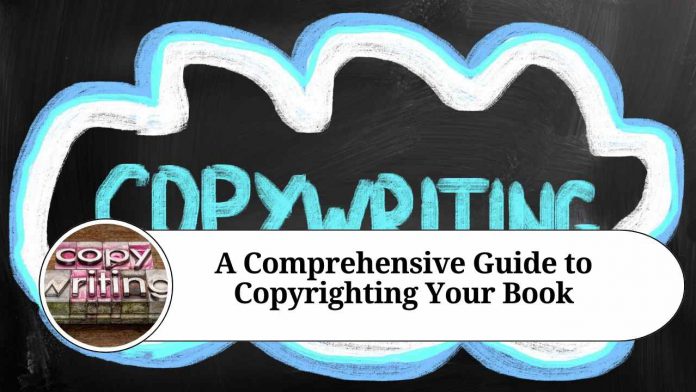Introduction
As an aspiring author, protecting your creative work is crucial. Copyrighting your book provides legal recognition and safeguards against unauthorized use or infringement. This blog post serves as a comprehensive guide to help you navigate the process of copyrighting your book, ensuring that your intellectual property remains secure.
What is Copyright?
Copyright is a form of intellectual property protection granted to the original creators of various works, including books, articles, music, art, and more. It grants authors exclusive rights over their creations, allowing them to control the reproduction, distribution, and adaptation of their work.
Copyright Protection for Books: When you create a book, whether it’s a novel, non-fiction work, poetry collection, or any other form of written expression, it is automatically protected by copyright law. In most countries, including the United States, this protection arises as soon as the work is fixed in a tangible form, such as being written down or saved on a computer.
Benefits of Copyright Registration:
While copyright protection exists without registration, obtaining formal registration offers several advantages:
- Legal Evidence: Registering your book with the copyright office provides you with legal evidence of your ownership. In the event of a dispute, having a registered copyright strengthens your position.
- Public Notice: Copyright registration establishes public notice of your claim, deterring potential infringers from using your work without permission.
- Ability to Sue: Copyright registration is a prerequisite for filing a lawsuit against someone who infringes upon your rights. Without registration, you may be limited in your legal options.
Steps to Copyright Your Book:
- Complete your Manuscript: Before registering your copyright, ensure that your book is complete and in its final form. Any subsequent modifications or additions will require separate copyright registration.
- Documentation: Gather the necessary documentation for copyright registration. This typically includes:
- Application Form: Obtain the appropriate application form from your country’s copyright office. In the United States, the form is called “Form TX” for literary works.
- Manuscript Copies: Prepare copies of your complete manuscript to submit along with the application.
- Application Fee: Check the applicable fees and payment methods required by your copyright office.
- Copyright Office Registration: Submit your completed application form, manuscript copies, and the required fee to your country’s copyright office. The specific process may vary depending on your location, so it’s important to consult the official guidelines provided by the relevant copyright authority.
- Copyright Notice: Although not mandatory, displaying a copyright notice in your book is recommended. The notice typically consists of the symbol ©, the year of first publication, and the author’s name. For example, “© 2023 John Doe.”
- International Copyright Protection: If you intend to distribute your book internationally, consider exploring copyright protection in each country. Some countries have reciprocal agreements that provide automatic protection, while others may require separate registration.
- Copyright Infringement: In the unfortunate event of copyright infringement, gather evidence of the infringement and consult with an attorney specializing in intellectual property law. Copyright registration will strengthen your case and increase the available legal remedies.
Conclusion
Copyrighting your book is an essential step in protecting your intellectual property as an author. While copyright protection arises automatically upon creation, formal registration provides additional legal benefits and safeguards. By following the steps outlined in this guide, you can ensure that your creative work is secure and enjoy the peace of mind that comes with knowing your rights are protected. Happy writing and copyrighting!
Disclaimer: This blog post is intended to provide general information and guidance. For specific legal advice regarding copyright, consult with an intellectual property attorney or refer to the copyright office in your country.
Other Related Blogs: Section 144B Income Tax Act
Frequently Asked Questions (FAQs)
Q1: When does copyright protection for a book begin?
A1: Copyright protection for a book begins as soon as the work is fixed in a tangible form, such as being written down or saved on a computer. It is important to note that copyright protection arises automatically and does not require formal registration.
Q2: Is copyright registration necessary for my book?
A2: No, copyright registration is not mandatory for copyright protection. Your book is protected by copyright law as soon as it is created. However, registering your copyright offers additional legal benefits and is highly recommended.
Q3: How do I register the copyright for my book?
A3: The process of registering the copyright for your book involves completing an application form, submitting copies of your manuscript, and paying the required fee. The specific steps and forms may vary depending on your country. Consult the guidelines provided by your country’s copyright office for detailed instructions.
Q4: How much does it cost to register the copyright for a book?
A4: The registration fee for copyright varies depending on the country. It’s advisable to check the official website of your country’s copyright office for the most up-to-date information on fees and payment methods.
Q5: Can I copyright my book internationally?
A5: Copyright protection is territorial, which means it is primarily governed by the laws of the country where the protection is sought. However, many countries have reciprocal agreements and treaties that provide automatic protection to foreign works. It is advisable to research the copyright laws of individual countries or consult with an intellectual property attorney to explore international copyright protection options.
Q6: Should I include a copyright notice in my book?
A6: While not mandatory, including a copyright notice in your book is recommended. The copyright notice typically consists of the symbol ©, the year of first publication, and the author’s name. For example, “© 2023 John Doe.” This notice serves as a reminder to others that your work is protected by copyright.
Q7: What should I do if someone infringes upon my copyright?
A7: In the event of copyright infringement, gather evidence of the infringement, such as copies of your original work and any communication regarding the infringement. Consult with an attorney who specializes in intellectual property law to discuss your options and take appropriate legal action. Copyright registration strengthens your case and provides additional remedies in case of infringement.
Q8: How long does copyright protection last for a book?
A8: The duration of copyright protection varies depending on the country. In most countries, including the United States, copyright protection typically lasts for the author’s lifetime plus an additional 70 years after their death. However, it is important to check the copyright laws of your specific country for precise details.
Q9: Can I copyright my book under a pseudonym?
A9: Yes, you can copyright your book under a pseudonym (pen name). When registering your copyright, provide your legal name as the author and include the pseudonym on the application if you wish to use it publicly.
Q10: Can I copyright an idea or a book title?
A10: Copyright protection does not extend to ideas, concepts, or book titles. Copyright protects the expression of ideas rather than the ideas themselves. However, titles can sometimes be protected under trademark law or other forms of intellectual property protection.




















